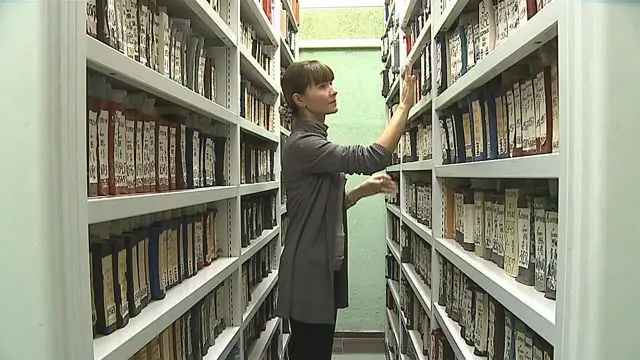- Author Antonio Harrison [email protected].
- Public 2023-12-16 07:44.
- Last modified 2025-01-22 21:44.
Today, in the minds of most people, an archivist is a woman who sits in a storage with documents, knits and sometimes looks at folders upon request. Is it so? Let's take a look at a few facts.

The profession of an archivist is relevant and in demand at any time. Archives exist in every institution, because in the process of work, clerical documents are accumulated. This means that an employee is also needed who can properly organize and store them. There are departmental, municipal, state and non-state archives. Of course, in different archives the work of an archivist has its own specifics. But what unites such employees is the main goal - the safety of documents. Consider 5 facts about the work of an archivist in the historical archive.
1. An employee of such an archive stores and interacts with documents of a certain historical period, a certain industry. So, the archive of modern history stores documentary evidence for the period from 1917 to the present day. The archive of the history of economics specializes in the preservation of documents on the history of the economy. The archive of ancient acts contains documents from the 9th to the 20th centuries. Historical archives or history education is a priority for workers in historical archives.
2. Archivists within the same institution carry out different types of activities. Each historical archive has employees responsible for the preservation, acquisition, restoration, as well as the scientific use and publication of archival documents.
3. Archivist is an entertaining and exciting profession. Indeed, the archival documents contain the true history, which cannot always be read in textbooks. And sometimes quite interesting finds are found among the documents. So, in the pre-revolutionary court cases of one of the archives, material evidence is stored: a tooth, a knife, a clump of beard and a woman's braid. In fact - materials about the trial of the fight.
4. Archivists of historical archives prepare exhibitions, publications, record television and radio broadcasts, conduct lectures, talks and school lessons. So another of their functions is to popularize the historical and documentary heritage and participate in the upbringing of the younger generation.
5. Archivists help people. For example, find information on family history to compile a genealogical tree, information about work in institutions, about joining a party, Komsomol organizations, and others.
So, we conclude that the profession of "archivist" is in demand and diverse. And, of course, it requires specific knowledge, skills and abilities. By the way, a lot of young people work in the archives today, as new technologies require new views and approaches. In archiving today, the latest technologies are used not only for the digitization of documents, but also for the production of exhibitions, journalistic activities, and the development of the Internet. Preserving the past, archivists keep pace with the times.






